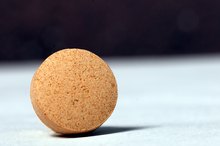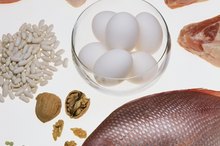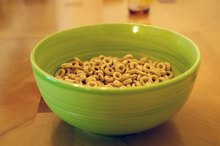Is Niacin Good or Bad for the Liver?
Niacin, also known as vitamin B-3, provides numerous health benefits when obtained from dietary sources such as peanuts, salmon, eggs, chicken and beets. It improves the health of your skin, eyes and hair; helps you convert carbohydrates to glucose for energyl and helps you metabolize fats and proteins. Dietary niacin also helps improve liver function, but taking niacin in prescription or over-the-counter formulas may damage your liver.
Dietary Niacin
Most people don’t need to take niacin supplements to obtain their recommended daily allowance of 14 mg to 16 mg. A 1-oz. serving of peanuts -- about a handful -- provides 3.4 mg of niacin. A 3 1/2-oz. serving of skinless roasted chicken contains 11.8 mg. Fortified breakfast cereals can also help you obtain enough niacin to promote healthy liver function. A single serving of some commercial brands of cereal provides more than a full day’s supply of niacin.
- Most people don’t need to take niacin supplements to obtain their recommended daily allowance of 14 mg to 16 mg. A single serving of some commercial brands of cereal provides more than a full day’s supply of niacin.
Niacin Supplements
The Link Between Niacin, Liver Damage & Alcohol
Learn More
Vitamin B-3 supplements come in three types: niacin, available only by prescription; niacinamide, the type of vitamin B-3 most commonly found in over-the-counter niacin formulas; and inositol hexanicotinate, another form of vitamin B-3 found in some niacin supplements available in drugstores and health food stores. If you take high amounts of niacin or niacinamide, you may incur liver damage. Side effects of inositol hexanicotinate remain largely unstudied. Doctors may prescribe niacin in amounts of up to 3,000 mg to treat cholesterol. Niacinamide and inositol supplements come in doses as high as 500 mg. You may incur side effects, including liver damage, if you take more than 100 mg a day.
- Vitamin B-3 supplements come in three types: niacin, available only by prescription; niacinamide, the type of vitamin B-3 most commonly found in over-the-counter niacin formulas; and inositol hexanicotinate, another form of vitamin B-3 found in some niacin supplements available in drugstores and health food stores.
- If you take high amounts of niacin or niacinamide, you may incur liver damage.
Liver Damage
Generally, liver damage becomes more likely the longer you take niacin. If you take niacin in any form, you should get your liver checked periodically. If you take very high doses of niacin, you may incur liver damage after brief use. An article in the November 2007 issue of “Annals of Emergency Medicine” reported that a patient required a liver transplant after taking 5,000 mg of niacin for a few days in an attempt to pass a drug screening test.
- Generally, liver damage becomes more likely the longer you take niacin.
- If you take very high doses of niacin, you may incur liver damage after brief use.
Considerations
Niacin and Impotence
Learn More
Niacin, prescribed for more than 50 years, proves effective in treating cholesterol, but over-the-counter formulas demonstrate no ability to improve cholesterol or prevent heart disease. Niacinamide supplements may treat niacin deficiencies, but talk to your doctor before taking niacin supplements for any reason. If you take niacin or niacinamide, side effects in addition to liver damage include nausea, diarrhea, headaches, vomiting, gout, stomach ulcers and vision loss. If you have kidney disease or diabetes, niacin may worsen these conditions.
- Niacin, prescribed for more than 50 years, proves effective in treating cholesterol, but over-the-counter formulas demonstrate no ability to improve cholesterol or prevent heart disease.
- Niacinamide supplements may treat niacin deficiencies, but talk to your doctor before taking niacin supplements for any reason.
Related Articles
References
- University of Maryland Medical Center: Vitamin B3 (Niacin)
- “Annals of Emergency Medicine”; Toxicity From the Use of Niacin to Beat Urine Drug Screening; Majoj Mittal, et al.; November 2007
- EurekAlert!; Misusing Vitamin to Foil Drug Test May Be Toxic; Plus, It Doesn’t Work; April 2007
- National Institutes of Medicine Office of Dietary Supplements. Niacin Fact Sheet for Health Professionals. Updated June 3, 2020.
- MedlinePlus. Niacin. Updated June 4, 2020.
- Boden WE, Probstfield JL, Anderson T, et al. Niacin in Patients with Low HDL Cholesterol Levels Receiving Intensive Statin Therapy. N Engl J Med. 2011;365(24):2255-2267. doi:10.1056/NEJMoa1107579
- Morris MC, Evans DA, Bienias JL, et al. Dietary niacin and the risk of incident Alzheimer's disease and of cognitive decline. J Neurol Neurosurg Psychiatry. 2004;75(8):1093-1099. doi:10.1136/jnnp.2003.025858
- Elam MB, Hunninghake DB, Davis KB, et al. Effect of Niacin on Lipid and Lipoprotein Levels and Glycemic Control in Patients With Diabetes and Peripheral Arterial Disease: The ADMIT Study: A Randomized Trial. JAMA. 2000;284(10):1263-1270. doi:10.1001/jama.284.10.1263
- Zhai G. Alteration of Metabolic Pathways in Osteoarthritis. Metabolites. 2019;9(1):11. doi:10.3390/metabo9010011
Writer Bio
Kathryn Gilhuly is a wellness coach based in San Diego. She helps doctors, nurses and other professionals implement lifestyle changes that focus on a healthy diet and exercise. Gilhuly holds a Master of Science in health, nutrition and exercise from North Dakota State University.









